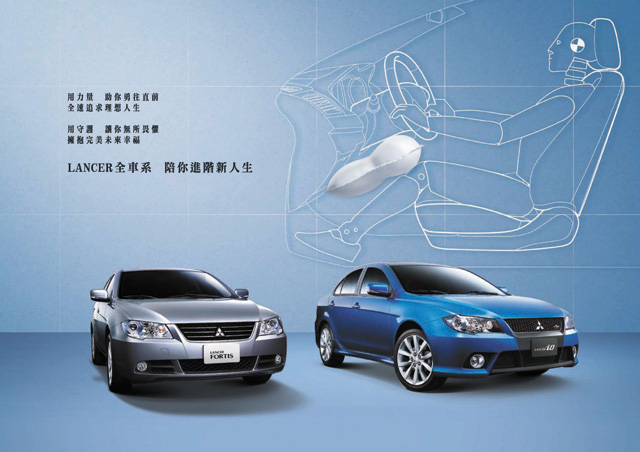China Motor of Taiwan Exports Mitsubishis to the Middle East
2012/04/05 | By Quincy LiangChina Motor Corp. (CMC) of Taiwan, the local assembler of Mitsubishis, recently claimed that its Japanese technical partner Mitsubishi Motors Corp. has agreed to its exporting to the Middle East a Taiwan-made model.
CMC, a subsidiary of Yulon Group or the largest carmaker in Taiwan, together with other Yulon affiliates assemble in Taiwan Mitsubishis, Nissans, Luxgens and tobes.
CMC sold some 51,000 new cars in 2011 in Taiwan and expects to maintain similar volume in 2012 and win more export opportunities amid the continued appreciation of the Japanese yen against the greenback.
In the past three years, according to Liu, CMC's sales volume of new cars in Taiwan rose from 36,456 units in 2008 to 54,891 units in 2011, commanding a market share of 14.9% as the long-time No. 2 automaker. "CMC will continue to focus on development of new four- and two-wheel products to further consolidate market position, and will aggressively boost exports to become a major overseas production base for Mitsubishi Japan," the president said.
Goals
Taiwan's car market faces uncertainties in 2012, Liu said, including mainly the sovereign debt issues hovering in Europe, the appreciation of the Japanese yen which raises cost of Taiwan-made vehicles etc. In recent years, the shrinking domestic market has resulted in fewer new models introduced for local production. In 2012, CMC plans to launch remodeled Lancer Fortis with more equipment and upgraded exteriors, as well as two imported sport utility vehicles (SUV), the Mitsubishi ASX and Pajero.
Liu disclosed that CMC is working with Mitsubishi Japan on remodeling the Colt Plus, and the two parties hope to launch a very different product in the most efficient way; while CMC hopes to gradually expand such cooperation for other models sold in Taiwan to enhance overall competitiveness.
To raise brand image, CMC plans to renovate all its sales/service points throughout Taiwan by replacing wooded décor, finishes with brighter silver tones, expecting to invest at least NT$500 million (US$16.7 million) and complete the works in 2013, as well as ask sales representatives to utilize more high-tech devices, such as tablet PCs, to introduce products to consumers.
A Start
Liu admitted that Taiwan's car market is fiercely competitive with less than 400,000 new cars sold per year shared by seven to eight automakers as well as numerous foreign brands. As CMC's quality is recognized by Mitsubishi Japan as one of the best among overseas plants, CMC decided to strive to win more chances to export cars.
CMC, in fact, has been negotiating with Mitsubishi Japan to export vehicles, but no ideal model and market has been selected, except exports of auto parts to overseas affiliates. Such condition, however, is expected to change with the sharp appreciation of the Japanese yen that is driving up Mitsubishi's costs.

In late 2011, Mitsubishi Japan allowed CMC export Taiwan-assembled Lancer Fortis sedans to Kuwait albeit in small volume, which CMC believes to be a good start.
China Market
The South East (Fujian) Motor Co., Ltd. (SEM) of China, a joint venture between CMC, Fujian Motor Industrial Group (FJMG) and Mitsubishi Japan, spells more hope for CMC.
According to Liu, China saw car sales hit a new record of some 18.43 million units in 2011, a minor 2% growth from the previous year due to high fuel prices and policy influences, but remains the world's largest automobile market where new-car sales are expected to grow 8.5% in 2012 to more than 20 million units.
SEM has been a major player in the booming Chinese automobile market for more than 10 years.
In recent years, Liu pointed out, new-car demand in China has slowed, leading to even oversupply. The Chinese central government is now more cautious about policies for the automotive industry, offering more incentives for new-energy vehicles and requiring more stringent fuel-consumption standards etc. In short, according to Liu, China is pursuing policies focusing on quality rather than volume-growth.
Ever more Chinese automakers, Liu said, are eyeing profitability rather than only sales volume, with the lower-end segment, originally dominated by "independent" or "indigenous" automakers (companies without ties with international brands), now also beset with fierce competition from famous international players with factories or joint ventures in China.
SEM's sales volume has exceeded 100,000 for at least two years, with healthy profitability, Liu said, adding that SEM plans to launch an A-class sedan in the fourth quarter of 2012 and will continue to launch at least one new model over the next few years. After gradually expanding production volume, Liu said, SEM will widen product line.




